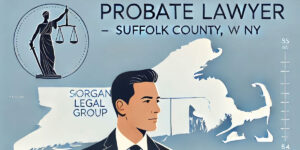Estate Planning and Trusts: Securing Your Legacy
Understanding the Basics of Estate Planning
Estate planning is a vital process that ensures your assets are protected, distributed according to your wishes, and managed effectively during your lifetime and after. It encompasses creating wills, trusts, and other essential documents to ensure your family’s financial security and reduce legal disputes. At Morgan Legal Group in New York City, we specialize in tailoring estate plans to meet your specific needs under New York State law.
Why Estate Planning Is Essential
Without a proper estate plan, your assets may be subject to lengthy probate processes, disputes among heirs, or unnecessary taxes. Estate planning offers a roadmap for managing your financial and medical decisions in case of incapacity and ensures that your legacy is preserved.
What Are Trusts and How Do They Work?
Trusts are legal arrangements where a trustee holds assets on behalf of beneficiaries. They are versatile tools in estate planning, offering benefits such as avoiding probate, reducing taxes, and protecting assets. Trusts can be customized to fit various goals, whether for minor children, charitable contributions, or business succession.
Types of Trusts in New York
The following are some commonly used trusts:
- Revocable Living Trust: Allows you to retain control of assets during your lifetime and avoid probate after death.
- Irrevocable Trust: Protects assets from creditors and reduces estate taxes, but cannot be modified without beneficiary consent.
- Special Needs Trust: Ensures financial security for individuals with disabilities without affecting their eligibility for government benefits.
- Charitable Trust: Facilitates donations to charities while offering tax benefits.
- Spendthrift Trust: Protects assets from being squandered by beneficiaries with poor financial habits.
The Role of an Estate Planning Attorney
Navigating estate laws in New York requires expertise. An experienced estate planning attorney helps you understand legal complexities, draft accurate documents, and avoid common pitfalls. At Morgan Legal Group, we provide end-to-end guidance to ensure your estate plan aligns with your goals and complies with state-specific regulations.
How We Help with Trusts
Creating and managing trusts involves precise legal and financial structuring. Our attorneys assist with:
- Determining the appropriate type of trust for your goals
- Drafting trust documents that are clear and legally binding
- Funding trusts with the necessary assets
- Providing ongoing advice for trust administration
Benefits of Establishing Trusts in Estate Planning
Avoiding Probate
One of the most significant advantages of trusts is bypassing probate, the court-supervised process of distributing an estate. Probate can be time-consuming and costly. Assets placed in a trust pass directly to beneficiaries, streamlining the transfer process.
Minimizing Taxes
Certain trusts, such as irrevocable trusts, can reduce estate taxes and protect wealth from being eroded by financial liabilities. Our attorneys implement strategies to maximize tax savings while adhering to New York’s tax laws.
Maintaining Privacy
Unlike wills, which become public during probate, trusts remain private. This confidentiality ensures that your financial affairs are not disclosed to the public or potential litigants.
Providing for Minor Children
Trusts are ideal for ensuring that minor children or dependents are financially supported. A trustee can manage the assets until the beneficiaries reach a specified age or milestone.
Common Mistakes in Estate Planning and Trusts
1. Failing to Fund the Trust
Establishing a trust without transferring assets into it renders it ineffective. Many individuals overlook this crucial step, leaving their estates vulnerable to probate.
2. Using Generic Documents
Online templates often fail to account for individual circumstances and New York-specific laws. A professional attorney ensures your trust documents are customized and legally enforceable.
3. Neglecting to Update Your Plan
Life changes, such as marriage, divorce, or the birth of a child, necessitate updates to your estate plan. Regular reviews ensure your documents remain relevant.
4. Overlooking Digital Assets
Digital assets, including online accounts, cryptocurrencies, and intellectual property, require explicit instructions for management and transfer. Our attorneys include these in your estate plan.
Frequently Asked Questions About Trusts
Who Should Be the Trustee?
The trustee should be someone reliable and financially savvy. In some cases, appointing a professional trustee, such as a bank or legal entity, may be the best option.
Can a Trust Be Changed?
Revocable trusts can be modified or revoked at any time during your lifetime. Irrevocable trusts, however, generally cannot be changed without the consent of the beneficiaries.
Do I Still Need a Will If I Have a Trust?
Yes. A will complements your trust and covers any assets not placed in the trust. A “pour-over will” ensures that these assets are transferred to the trust upon your death.
How Morgan Legal Group Can Help
Our attorneys specialize in creating customized estate plans that include trusts tailored to your specific goals. We provide comprehensive services, including document preparation, tax-efficient strategies, and legal counsel for trustees and beneficiaries.
Contact Morgan Legal Group Today
Don’t leave your legacy to chance. Whether you’re just starting your estate plan or need to update existing documents, Morgan Legal Group is here to help. We understand the unique challenges of New York State law and provide personalized solutions to ensure your assets are protected.
📍 Location: 100 Church Street, 8th Floor, New York, NY 10007
📞 Contact: (888) LAW-1315
🌐 Website: www.morganlegalny.com
Secure your peace of mind today. Contact us for a consultation and take the first step toward a secure future for you and your loved ones.









